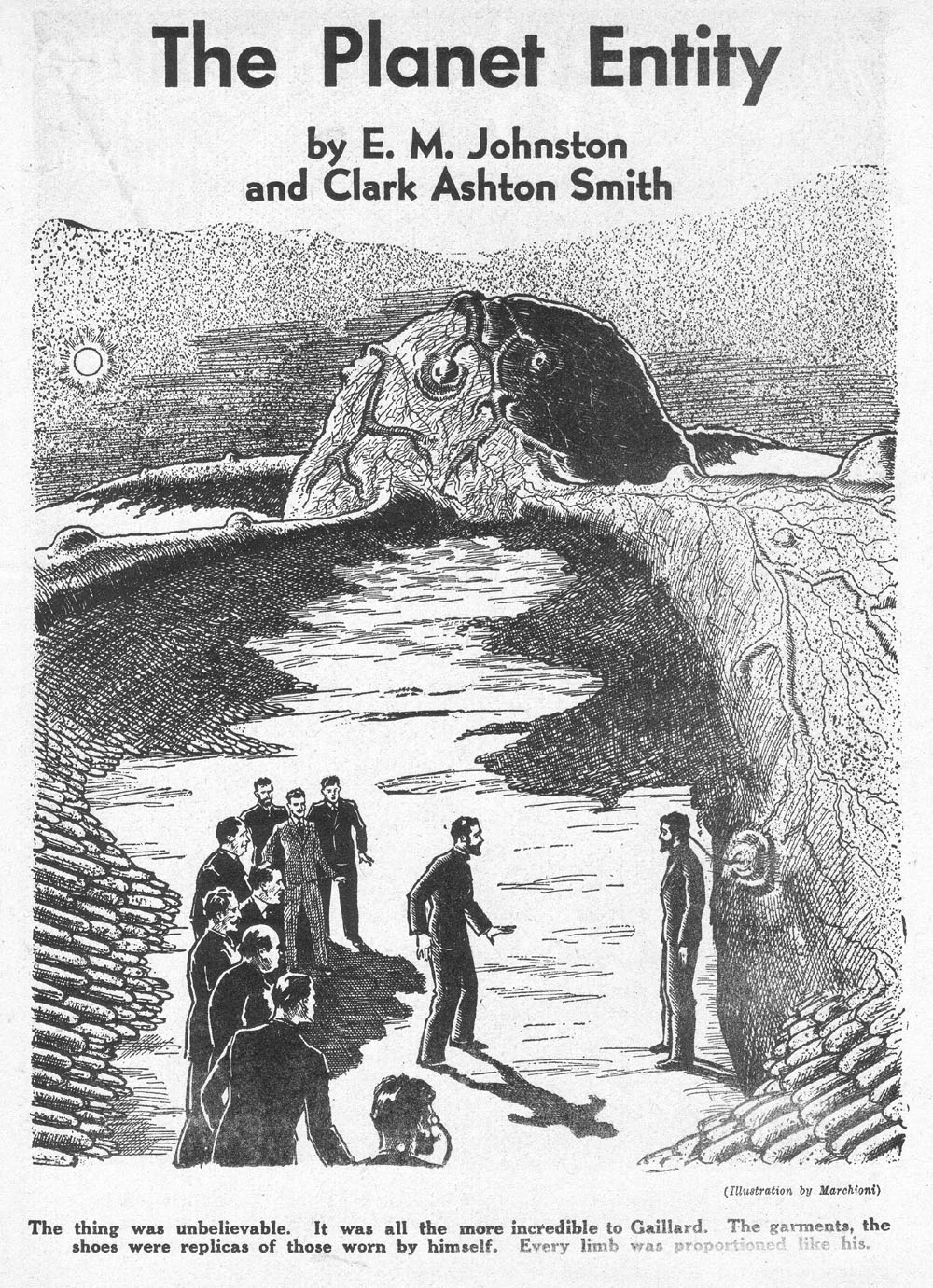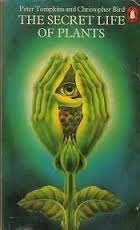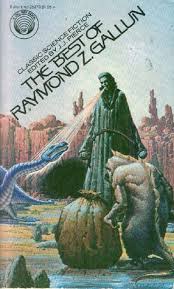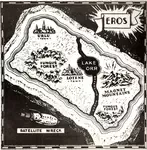- Home
- >
intelligent plants in the old solar system
Vegetable intelligence has sprouted in quite a few nooks of the OSS. A challenging theme for a story - because, of course, it more or less forces the writer to invent a new type of intelligence.
Stid: The problem is, the best examples are way outside the Solar System. I refer to the "plant men" in Star Maker and the passive-invasive "mirroring" intelligence in The Garments of Caean. Those accounts certainly do give us the "new type" you mention. But they're light-years out in the Galaxy.
Zendexor: Not to worry, you'll see, we'll do all right with what's closer to home.
vegetable overlord
We mention on our Weinbaum page the brainy Venusian plants of The Lotus Eaters. Mars also has its plant-intellect... one who (like Gandalf) does not mind explaining its cleverness more than once.
 The Planet Entity a.k.a. Seedling of Mars
The Planet Entity a.k.a. Seedling of Mars"...I perceive that there is much ignorance and dogmatism and blind self-interest to be overcome, before the excelling light which I proffer can illumine the darkness of earthly minds.
"After I have kept you here for a few days, and have instructed you thoroughly in the secrets of my transcendent wisdom, and have imbued you with surprising powers that will serve to demonstrate my omnivalent superiority to the nations of Earth, I shall send you back to Earth as my ambassadors, and though you will meet with much opposition from your fellows, my cause will prevail in the end, beneath the infallible support of truth and science."
Thus the planetary plant lord in Seedling of Mars, who, having learned English in a few hours, addresses its involuntary human guests via an outgrowth with a speaking mouth grown for the purpose. It has such powers, it can do just about what it likes. The story's original title, The Planet Entity, fits it better than "Seedling".
No wonder it acquires supporters, among those whom it has abducted.
Admittedly, one faction among the humans had refused to be impressed; these dissidents had been allowed by the plant - for reasons of its own - to escape; while the men who remained to listen are fast developing an almost religious veneration for the Entity whose creeping roots girdle the Red Planet.
The style of this story - mellifluous, pompous - perfectly captures the condescending menace and specious attractiveness of the plant lord's promise.
"I am, as you may have already surmised, the sole inhabitant of this world. I could multiply myself if necessary; but so far, for reasons which you will soon apprehend, I have not felt that this would be desirable. Being complete and perfect in myself, I have had no need for companionship with other entities; and long ago, for my own comfort and security, I was compelled to extirpate certain rival plant-forms, and also certain animals who resembled slightly the mankind of your world; and who, in the course of their evolution, were becoming troublesome and even dangerous to me.

"With my two great eyes, which possess an optic magnifying power beyond that of your strongest telescopes, I have studied Earth and the other planets during the Martian nights, and have learned much regarding the conditions that exist upon each. The life of your world, your history, and the state of your civilization have been in many ways an open book to me; and I have also formed an accurate idea of the geological, faunal and floral phenomena of your globe. I understand your imperfections, your social injustice and maladjustment, and the manifold disease and misery to which you are liable, owing to the dissonant, multiple entities into which the expression of your life-principle has been subdivided...
"Your world is still young... You have more than is requisite of the element which I lack; and I have brought you here, as representative members of mankind, to propose an exchange which cannot be anything but beneficial to you as well as to myself.
"In return for a modicum of the water of your world, I will offer you the secrets of eternal life and infinite energy..."
Stid: I see what you mean about the style.
Zendexor: Hemingway would be the wrong author to write this story. You want something fluently verbose that rocks the reader into a sort of trance. The monotony of the tone actually helps the irony of the tale - the good done to the plant's supporters, and the harm done to its enemies, are described with dispassionate equality, and that is the point - the Olympian point, of this cute saga.
Stid: And what do you think of the sense of it? I mean, the logical justification of it. Do we get shown that different type of intelligence which, you said earlier, a vegetable would have to have?
Harlei: Hey, remember, this author is Clark Ashton Smith, myth-maker and poet; he doesn't have to make rational sense - his tales are verbal pictures, verbal music, verbal jewellery... but not serious except as a sparkling gem is "serious".
Zendexor: I second that. But the story does contain one serious science-fictional idea: that of a type of evolution which allows for a single individual's growth to take the place of species development. That way you get just one entity, straddling a planet! If it did happen, I dare say such a position could only be achieved by a plant.
vegetable invaders
A similar monopoly of power, though not by one individual, is enjoyed by the Martian plant intelligences in Seeds of the Dusk, in the far future of the Solar System. You may well think this portrayal more "realistic".
Spores are projected through space to Earth, and in hidden out-of-the-way places they find room to grow:

And now, perhaps, the thing was beginning to feel the first glimmerings of a consciousness, like a human child rising out of the blurred, unremembering fog of birth. Strange, oily nodules, scattered throughout its tissues, connected by means of a complex network of delicate, white threads, which had the functions of a nervous system, were developing and growing - giving to the spore plant from Mars the equivalent of a brain. Here was a sentient vegetable in the formative stage.
A sentient vegetable? Without intelligence it is likely that the ancestors of this nameless invader from across the void would long ago have lost their battle for survival.
What senses were given to this strange mind, by means of which it could be aware of its environment? Undoubtedly it possessed faculties of sense that could detect things in a way that was as far beyond ordinary human conception as vision is to those individuals who have been born blind. But in a more simple manner it must have been able to feel heat and cold and to hear sounds, the latter perhaps by the sensitivity of its fine, cilialike spines. And certainly it could see in a way comparable to that of a man.
For, scattered over the round body of the plant, and imbedded deep in horny hollows in its shell, were little organs, lensed with a clear vegetable substance. These organs were eyes, developed, perhaps, from far more primitive light-sensitive cells, such as many forms of terrestrial flora possess.
Stid: So they have eyes! Like those of Clark Ashton Smith's Martian plant lord, though its are somewhat bigger -
...two enormous masses, clear and lucent like water, which combined the size of lakes with the form and appearance of optic organs...
 contains Seeds of the Dusk
contains Seeds of the DuskZendexor: But Gallun's Martian plants don't make speeches. We're into a different kind of fun here... Like the plant lord in Seedling of Mars, the invaders in Seeds of the Dusk are masters of chemistry and biochemistry, able to synthesize what they want inside their own bodies, like living factories; but rather than offer any kind of deal (which wouldn't be possible anyway with the degenerate humans of that far future day) they strike when they can, hard.
Harlei: Incidentally, though you call them Martian, the story suggests that they originated, in some previous epoch, on Ganymede.
Zendexor: Yes, they drift from world to world, and at the end of the story there's a suggestion that when Earth finally freezes they may drift to Venus. But they did have a long-lasting civilization on Mars. See the page on the far future.
brain plants
Stid: Whereas the poor old Venusian brain-plants in The Lotus Eaters don't have much future at all, the poor saps.
Zendexor: No, no survival instinct whatsoever. No defences, just superb brains.
The things were like inverted bushel baskets, about the size and contour, veined, flabby, and featureless save for a complete circle of eye spots. And now he could even see the semitransparent lids that closed, apparently, to shield the eyes from the pain of their lights.
They were barely a dozen feet from one of the creatures. Pat, after a moment of hesitation, moved directly before the motionless mystery.
"Well!" she said. "Here's a new one, Ham. Hello, old fella."
An instant later both of them were frozen in utter consternation, completely overwhelmed by bewilderment, amazement, and confusion. Issuing, it seemed, from a membrane at the top of the creature, came a clicking, high-pitched voice:
"Hello, fella," it said.
There was an appalled silence. Ham held his revolver, but had there been need, he couldn't have used it, nor even remembered it. He was paralyzed; stricken dumb.
But Pat found her voice. "It - isn't real," she said faintly. "It's a tropism. The thing just echoed whatever sounds strike it. Doesn't it, Ham? Doesn't it?"
"I - I - of course!" He was staring at the lidded eyes. "It must be. Listen!" He leaned forward and yelled, "Hello!" directly at the creature. "It'll answer."
It did. "It isn't a tropism," it clicked in shrill but perfect English.
a plant city
Harlei: I like those Weinbaum plants, with their big useless brains which do them no good. Doubtless the inspiration for the Mercurian brain-cacti in Valeddom. But for less haunting yet more picturesque effects, we need vegetation with more muscle and more enterprise. I nearly said 'more get-up-and-go', but the technologically-evolved plants in Ten Million Years Ahead are still rooted. However, they have managed to build a city!
Stid: Are you going to quote from it, then? That old Hamilton tale? Bear in mind that it dates from 1931, about a year before Hamilton shed his clunky style.
Zendexor: Let Harlei quote from it. Ten Million Years Ahead is verbose and full of repetition, but it gives us something unique: I don't know where else in the Old Solar System you could visit an actual plant city. Go ahead, Harlei.
Harlei: Thanks. I love this stuff. Let's clunk away.
The city was round, enclosed by a thick wall of white metal two-score feet in height. Just inside that wall was a circular row of deep square pits whose purpose in that first glance was not clear to us. Inside this circle of pits were circular rows of great gleaming machines very strange in appearance. They stood in the open air upon the smooth black soil that formed the city's floor. Some of them were apparently giant mixing-machines, that used paddle-like arms to crush up masses of various lichens and mosses with other materials in sunken tanks. Others turned forth linked lengths or great bars of the shining metal. Still others were too vague for our eyes to distinguish.
But the most astounding feature was that before each of these machines was rooted in the ground one of the great green plants, operating and controlling its machine with its tendril arms.
The sight was incredible - this city of plants in which plants worked steadily and intelligently, rooted as they were. I could see many of the huge stalking-machines coming and going across this unearthly plant metropolis, each with plants rooted in the soil of their cups, directing the stalking-machines as we had seen them in the forest, carrying enormous burdens back and forth with them. The plants in the stalking-machines were the only ones that moved, however, all the others in the city being rooted in the ground by whatever machine or spot that held their particulars.
I saw beyond the rows of machines, toward the amazing city's center, rows of smaller plants that had apparently no work assigned them, growing in great beds and awaiting their full stature before taking up their part of the city's life. Stalking-machines were transplanting some of the larger of them even as we watched, placing them by whatever machine or task had been assigned them. And in beyond even these I glimpsed at the city's far center a circle of unusually large plants of which grew one positively huge. The plant-ruler of this weird plant-city, growing at its center and ruling it by whatever strange senses they used for sight and speech!
And, last and most terrible feature of all, there moved through the plant-city hundreds - yes, thousands - of human slaves...
Barrington Bayley, The Garments of Caean (1976); Raymond Z Gallun, "Seeds of the Dusk" (Astounding Science Fiction, June 1938); Robert Gibson, Valeddom (2013); Edmond Hamilton, "Ten Million Years Ahead" (Weird Tales, April-May 1931); Clark Ashton Smith, "Seedling of Mars" (Wonder Stories Quarterly, Fall 1931); Olaf Stapledon, Star Maker (1937); Stanley G Weinbaum, "The Lotus Eaters" (Astounding Stories, April 1935)
See the extract, Brainy Mercurian cacti.
For The Bloodless Peril by Will Garth, see Those Plants Again.





























